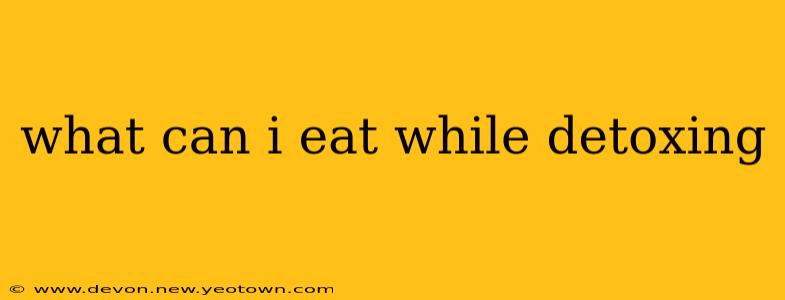What Can I Eat While Detoxing? A Journey to a Healthier You
The word "detox" conjures images of restrictive diets and intense cleanses, but the truth is far more nuanced. A true, medically supervised detox is usually only necessary for individuals dealing with specific toxin exposures. However, many people use the term "detox" to describe a period of eating healthier to support their body's natural cleansing processes. This approach focuses on nourishing your body with foods that promote liver and kidney function, supporting their natural detoxification abilities. So, what can you eat while embarking on this healthier path?
Let's explore the delicious and surprisingly diverse world of detox-friendly foods. Remember, this isn't about deprivation, but about making informed choices that boost your overall well-being.
What are the best foods to eat during a detox?
The best foods to focus on during a detox-focused diet are those rich in antioxidants, vitamins, and minerals. These nutrients help your body combat oxidative stress, a contributor to inflammation and cellular damage. Think vibrant fruits and vegetables, lean proteins, and healthy fats.
-
Leafy Greens: Kale, spinach, collard greens – these powerhouses are packed with vitamins, minerals, and fiber, aiding digestion and detoxification. Try adding them to smoothies, salads, or sautéing them as a side dish.
-
Cruciferous Vegetables: Broccoli, cauliflower, Brussels sprouts – these contain compounds that support liver function. Roast them, steam them, or add them to stir-fries for a delicious and healthy meal.
-
Citrus Fruits: Lemons, limes, oranges – these are rich in Vitamin C, a powerful antioxidant, and aid digestion. Start your day with a warm lemon water drink or add citrus slices to your salads.
-
Berries: Blueberries, strawberries, raspberries – these are bursting with antioxidants that combat free radicals, protecting your cells from damage. Enjoy them as a snack or add them to yogurt or oatmeal.
-
Lean Protein: Chicken breast, fish (salmon, tuna), beans, lentils – these provide the building blocks for repair and cell regeneration. Choose lean sources to minimize saturated fat intake.
-
Healthy Fats: Avocado, nuts (almonds, walnuts), seeds (chia, flax) – these provide essential fatty acids and support hormone production. Add avocado to your salads or toast, sprinkle nuts and seeds on your yogurt or oatmeal.
-
Water: This is arguably the most important element. Water helps flush out toxins and keeps your body functioning optimally. Aim for at least eight glasses a day.
What foods should I avoid during a detox?
While focusing on what to eat is crucial, understanding what to avoid is equally important. This isn't about strict elimination, but about mindful reduction.
-
Processed Foods: These are often high in sodium, unhealthy fats, and additives that can strain your body.
-
Refined Sugars: These contribute to inflammation and can hinder your body's natural detoxification processes.
-
Excessive Caffeine and Alcohol: These can dehydrate you and put extra stress on your liver and kidneys.
-
Red Meat: While not entirely off-limits, limiting red meat intake during a detox can be beneficial due to its higher saturated fat content.
What is the best detox diet plan?
There's no one-size-fits-all detox diet plan. The best approach is to focus on incorporating nutrient-rich whole foods into your diet while reducing processed foods, added sugars, and excessive caffeine and alcohol. Consulting a registered dietitian or nutritionist can help you create a personalized plan that aligns with your individual needs and health goals. They can also help you determine if a detox is even necessary for you.
Is it safe to detox?
For most healthy individuals, focusing on a diet rich in whole foods and avoiding processed foods is generally safe. However, extreme detox diets can be dangerous and lead to nutrient deficiencies. Always consult a healthcare professional before starting any significant dietary changes, particularly if you have underlying health conditions.
How long should I detox?
The duration of a detox-focused dietary approach varies, but most people find a period of 2-4 weeks beneficial. The goal isn't a quick fix, but a sustainable shift towards a healthier lifestyle.
This journey to a healthier you doesn't have to be daunting. By focusing on nutrient-rich foods and making mindful choices, you can support your body's natural detoxification processes and feel your best. Remember, consistency and a holistic approach are key to achieving long-term wellness.

